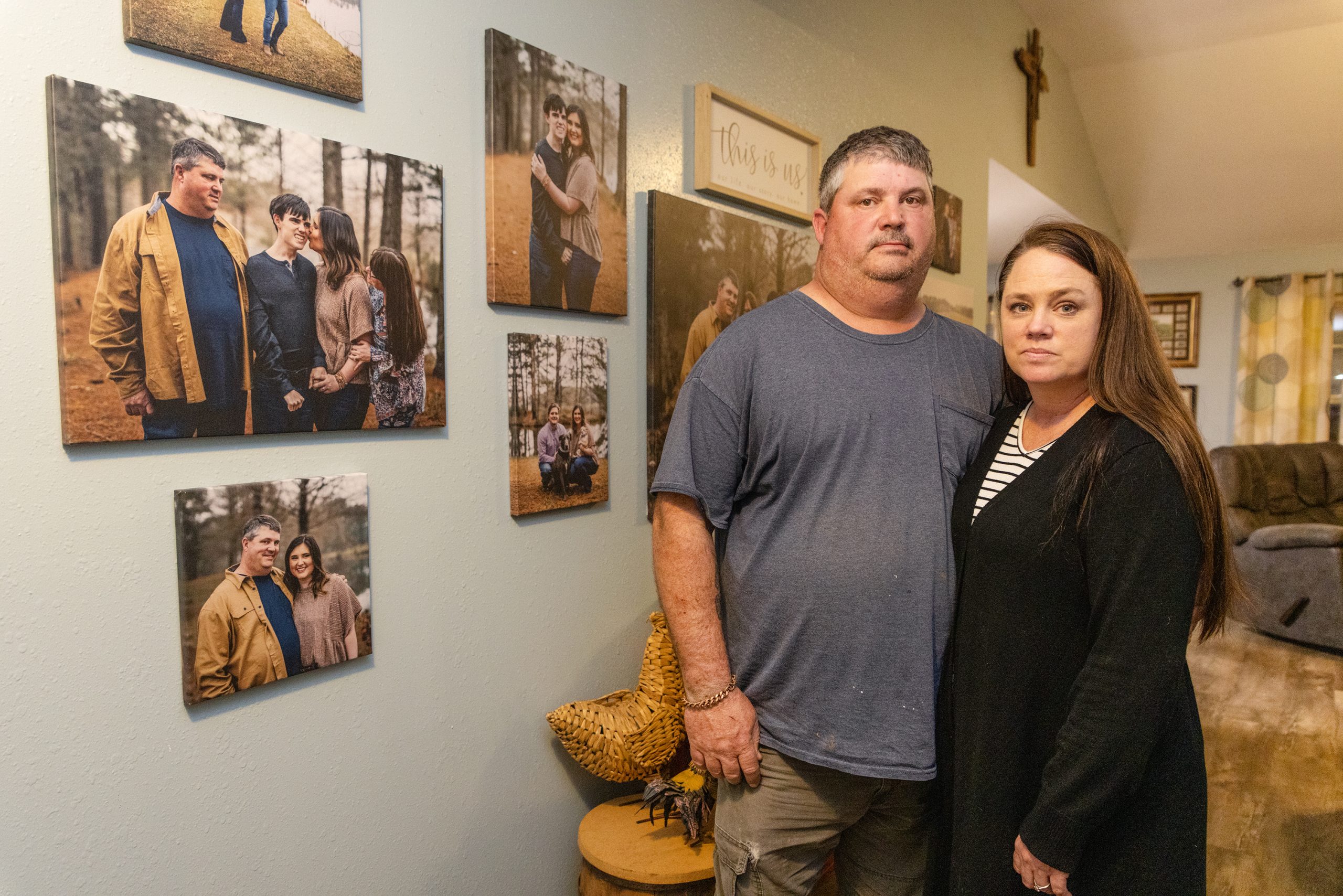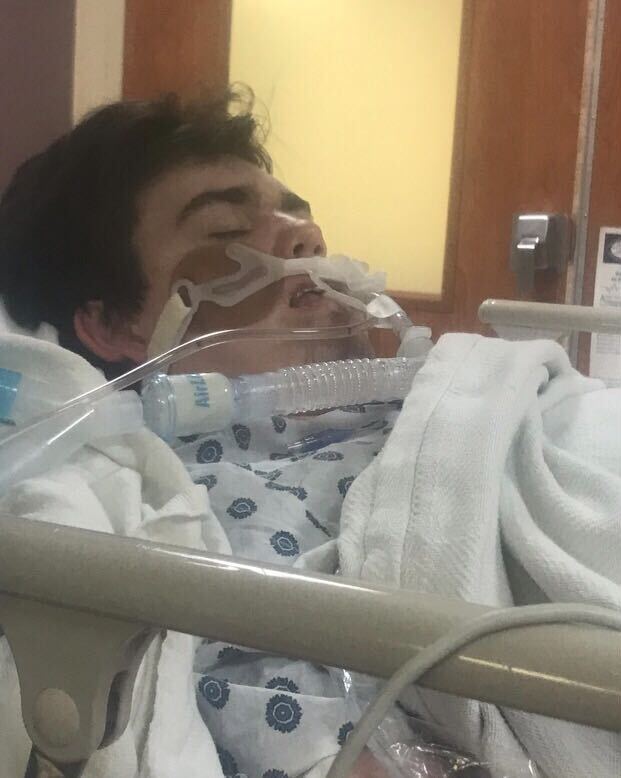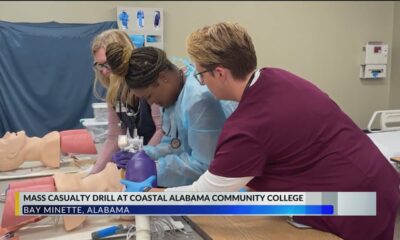Mississippi News
How Mississippi’s mental health system failed this family in crisis

‘Shut down every step of the way’: How Mississippi’s mental health system failed this family in crisis
Lacey and Teddy Hutchinson of Mize watched, tears streaming down their faces, as their son was intubated and flown by helicopter to Merit Health River Region Hospital in Vicksburg because he needed mental health services the state of Mississippi could not provide.
On Feb. 7, their 22-year-old nonverbal autistic son Colby had a violent outburst with his babysitter, so extreme she had to hide under a table to protect herself from harm.
Lacey and Teddy quickly left their jobs and rushed home. They called 911, and two sheriff’s deputies who had received crisis intervention training were dispatched there.
Though Lacey said the deputies were compassionate and helpful, Colby could not be calmed down. So officers handcuffed him, and he was transported to Magee General Hospital, where he was given a high amount of antipsychotic medications that left him unconscious, Lacey said.
Colby’s physician assistant at Magee quickly started making calls to find a hospital with a psychiatric unit that would take him, Lacey said. He reached out to Forrest General Hospital, University of Mississippi Medical Center, St. Dominic’s, and Boswell Regional Center, among others. All had the same message: no beds are available.
“He tried so hard to find a place for Colby, but we were shut down every step of the way,” Lacey said.
Jane Walton, Communications Director at Disability Rights Mississippi, a nonprofit organization that advocates for Mississippians with disabilities, said that the Mississippi Department of Mental Health (DMH) needs to increase the number of inpatient beds at state hospitals so that those in crisis, like Colby, aren’t left without care.
She also said an emphasis needs to be placed on making sure the county one lives in doesn’t dictate a person’s access to community-based care.
“They (the Hutchinsons) got the worst of the worst at every turn. But I think this highlights how at really every turn there are barriers for people with disabilities and their families to receiving the care that they need in Mississippi,” Walton said.

As the pandemic overwhelmed hospitals, it also impacted another area of healthcare: mental health services in facilities operated by the state.
In January, DMH had more than 1,000 fewer employees than it did a year earlier.
Out of options and unable to safely take Colby home, Lacey and Teddy decided to accept a doctor’s recommendation to intubate Colby and send him by air ambulance to Merit Health River Region Hospital in Vicksburg. Lacey felt her state and nation had failed her and her family.
“I was overwhelmed by that feeling of hopelessness,” Lacey said. “Knowing that I couldn’t be there with him, I was terrified, and don’t want anybody else to have to go through that.”
If the system was working as it should, Colby would have been admitted to a nearby psychiatric ward or state hospital with specific services for patients with disabilities, but that didn’t happen.
Colby spent two days intubated in the emergency room. After being taken off the ventilation, he was given medications to temper his aggression and restrained to his bed when those efforts failed. While the staff was giving Colby the best care they could, Lacey said, being so heavily medicated that he was rendered unconscious isn’t what he needed.
During that time, Lacey and Teddy, both of whom work, had taken vacation days so they could be with Colby. One night, they even slept in their car to avoid a costly hotel stay. Exhausted and heartbroken, they reached out to their representatives in the state legislature and Wendy Bailey, executive director of the Mississippi Department of Mental Health.
Bailey helped secure Colby a bed at East Mississippi State Hospital in Meridian so his medications could be properly adjusted, Lacey said. After a week there and with his behavior under control, Colby was admitted to Boswell Regional Center.
“We are so thankful Colby is now getting the help he needs, but it shouldn’t have taken such extreme measures to get him these services,” Lacey said. “The state really needs to have plans in place to better handle situations like this.”
The mental health crisis Colby experienced didn’t appear out of thin air. It had been building to that point for months.
Colby had previously been a resident of Boswell Regional Center, one of five regional facilities in the state that treats people with intellectual and developmental disabilities. But in October 2020, he had to leave due to a bowel obstruction that put him in Forrest General Hospital in Hattiesburg for 28 days. That stay involved three separate intestinal surgeries and caused Colby to drop from 126 to 79 pounds. He also had seizures regularly, some lasting as long as 45 minutes, due to being unable to take his seizure medications by mouth, his mother said.
When the Hutchinsons were able to bring Colby home, he had a colostomy bag and was too weak to be readmitted to Boswell. Thankfully, they were able to get Colby adequate at-home care through the Mississippi Medicaid Home & Community Based waiver program.

At-home care was working for the Hutchinsons until October of last year when Colby began exhibiting serious behavioral issues. They reached out to Boswell in late December with the hope of readmitting Colby but were told that would not be possible due to COVID-related staffing issues.
By January, Colby’s condition had deteriorated significantly. He was only sleeping for four hours each night, and his parents were bruised daily during his violent outbursts. Adding extra hours to Colby’s behavioral support care, medication adjustments and new behavioral management strategies all failed to address the issue.
This downward spiral continued and only grew more severe until the breaking point on Feb. 7.
After struggling for so long to get Colby the care he needs, Lacey is frustrated with the inadequacies of the state’s mental health system and feels like COVID-19 is used as an “excuse” to deny care.
“I think somebody could have stepped up and said ‘Okay, this family is in need. We need to do something for him,’” Lacey said.
But Bailey said in order to maintain the quality of care, DMH had to adjust.
“Some of our programs have had to reduce bed capacity so that they can operate in a safe manner,” Bailey told Mississippi Today.
Virus outbreaks at facilities that require quarantine periods and staff calling out sick has also caused bed capacity to decrease.
Bailey said that DMH’s ultimate goal is to get staffing and program capacity levels back to pre-pandemic levels and then focus heavily on expanding access to community-based care.
Last year, U.S. District Court Judge Carlton Reeves ruled in favor of the U.S. Department of Justice, which had sued the state of Mississippi on allegations it violated The Americans With Disabilities Act by not prioritizing treating mental health patients in community settings when possible instead of placing them in hospitals.
The budgetary increases DMH needs to implement new community-based care initiatives will likely come from Mississippi’s share of American Rescue Plan Act funds. Senate Bill 2865 would provide over $104 million to DMH to address issues exacerbated by the pandemic.
It has passed in the Senate, but would need to be approved in the House to reach Gov. Tate Reeves’ desk.
The proposal focuses on initiatives to improve the state’s crisis system for people like Colby. Among the initiatives in the proposal is the addition of 60 beds in crisis stabilization units, which exist to treat people experiencing a psychiatric crisis without an inpatient admission to a state hospital. Another initiative would create crisis diversion homes that will allow patients like Colby to be diverted from institutional settings, but still receive 24/7 care.
Bailey said that often people who experience a mental health crisis and are institutionalized have exhausted their current living situations and have no other alternative.
“That’s not going to always work,” Bailey said. “There’s always going to be situations that require a higher level of care, but if we can serve somebody in the community and prevent that (institutionalization), that’s what we want to do.”
Joy Hogge, Executive Director of Families as Allies, said that the problem with adding services is that it attempts to solve a problem without improving systems already in place.
“It (the ARPA proposal) seems very focused on adding services,” Hogge said. “And I know we need services, but the infrastructure needs to be created so that those services are coordinated across the system.”
This article first appeared on Mississippi Today and is republished here under a Creative Commons license.
Mississippi News
Events happening this weekend in Mississippi: April 18-20

SUMMARY: This weekend (April 18-20), Mississippi offers a variety of events for all ages. In Jackson, enjoy Food Truck Friday, a jazz concert, free outdoor movie screenings, and multiple exhibitions including “Of Salt and Spirit” and “Hurricane Katrina: Mississippi Remembers.” For family fun, there’s an Easter Egg Hunt at the Ag Museum and “Bunnies & Butterflies” at MCM. Natchez features the Spring Pilgrimage, Lafayette’s 200th anniversary celebration, and a farmers market. In the Pine Belt, highlights include Live at Five, a Spring Candle-Making Workshop, and Easter events at the Hattiesburg Zoo. Don’t miss the Bluff City Block Party and more!
The post Events happening this weekend in Mississippi: April 18-20 appeared first on www.wjtv.com
Mississippi News
Events happening this weekend in Mississippi: April 11-13

SUMMARY: This weekend in Mississippi (April 11-13), enjoy a variety of events across the state. Highlights include the Eudora Welty Birthday Bash in Jackson, Trivia Night at the Mississippi Museum of Natural Science, and Boots & Bling Fundraiser in Natchez. For family fun, check out the Bunny Bonanza in Jackson or the Easter Egg Hunt in Clinton. The Natchez Concours d’Elegance Car Show and Stranger Than Fiction Film Festival offer cultural experiences, while the 12th Annual Dragon Boat Regatta in Ridgeland and the Hub City Classic Car Show in Hattiesburg provide exciting activities for all ages.
The post Events happening this weekend in Mississippi: April 11-13 appeared first on www.wjtv.com
Mississippi News
Ole Miss women get pair of double-doubles and roll to 83-65 March Madness win over Ball State

SUMMARY: Mississippi coach Yolett McPhee-McCuin found solace in returning to a different arena in Waco, Texas, following a disappointing previous tournament experience. The No. 5 seed Ole Miss Rebels redeemed themselves with an 83-65 victory over 12th-seeded Ball State in the NCAA Tournament’s first round. Starr Jacobs led the Rebels with 18 points and 11 rebounds, while Kennedy Todd-Williams and Madison Scott each scored 15 points. Ole Miss dominated rebounding, leading 52-32, and will face fourth-seeded Baylor next. Coach McPhee-McCuin noted the team’s evolution since their last visit and the significance of playing in Texas, where Jacobs feels at home.
The post Ole Miss women get pair of double-doubles and roll to 83-65 March Madness win over Ball State appeared first on www.wjtv.com
-

 News from the South - Alabama News Feed7 days ago
News from the South - Alabama News Feed7 days agoFoley man wins Race to the Finish as Kyle Larson gets first win of 2025 Xfinity Series at Bristol
-

 News from the South - Alabama News Feed7 days ago
News from the South - Alabama News Feed7 days agoFederal appeals court upholds ruling against Alabama panhandling laws
-

 News from the South - Missouri News Feed4 days ago
News from the South - Missouri News Feed4 days agoDrivers brace for upcoming I-70 construction, slowdowns
-

 Mississippi Today4 days ago
Mississippi Today4 days agoSee how much your Mississippi school district stands to lose in Trump’s federal funding freeze
-

 News from the South - North Carolina News Feed6 days ago
News from the South - North Carolina News Feed6 days agoFDA warns about fake Ozempic, how to spot it
-

 News from the South - Virginia News Feed5 days ago
News from the South - Virginia News Feed5 days agoLieutenant governor race heats up with early fundraising surge | Virginia
-

 News from the South - Missouri News Feed6 days ago
News from the South - Missouri News Feed6 days agoAbandoned property causing issues in Pine Lawn, neighbor demands action
-

 News from the South - West Virginia News Feed7 days ago
News from the South - West Virginia News Feed7 days agoHeart disease survivor spends 15th birthday raising money for American Heart Association














































